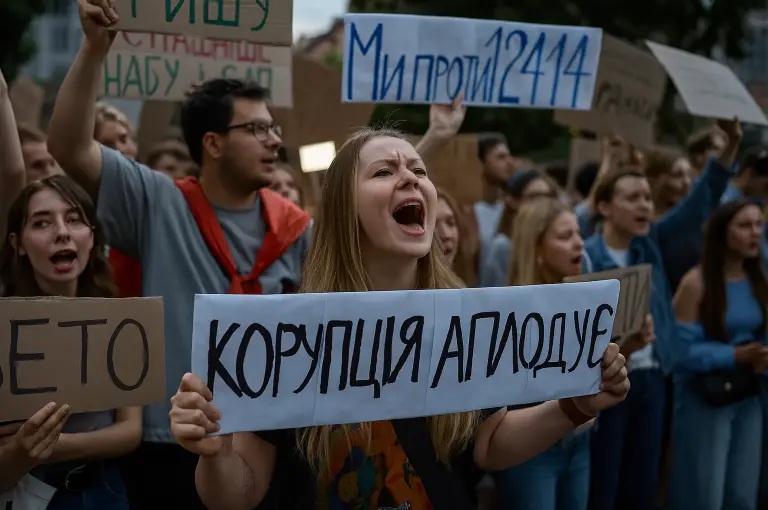Ukrainian President Volodymyr Zelensky has sparked an uproar, arousing significant domestic and international criticism over his recent reforms weakening the independence of key anti-corruption agencies.
On July 22, 2025, Zelensky signed a controversial bill that places the National Anti-Corruption Bureau (NABU) and the Specialized Anti-Corruption Prosecutor’s Office (SAPO) under the direct control of the Prosecutor General’s Office (PGO).
The PGO is an institution appointed by Zelensky himself.
Domestically, the legislation has triggered widespread outrage.
Thousands of Ukrainians protested in Kyiv and multiple other cities.
These cities include Lviv, Dnipro, and Odesa.
They protested, expressing fears that these reforms represent a significant step backward in Ukraine’s ongoing fight against systemic corruption.
Demonstrators see the bill as undermining the autonomy of institutions crucial for rooting out corruption that has long plagued the country since the 2014 Euromaidan revolution.
Protest signs such as “We chose Europe, not autocracy” and “My father did not die for this” highlighted popular concerns that the reforms could entrench autocratic tendencies rather than strengthen democratic governance.
Critics argue that the new law effectively neuters NABU and SAPO.
According to them, it does this by subordinating them to the Prosecutor General, who now has the power to transfer corruption cases and reassign prosecutors, thereby diluting independent oversight.
The agencies themselves warned that the “head of SAPO will become merely a symbolic figure, while NABU will lose its independence and effectively become a division of the prosecutor general’s office”.
Anti-corruption campaigners, including prominent figures like Vitalii Shabunin who face government pressure and legal challenges seemingly linked to their activism, view this move as a broader crackdown on independent media and watchdog institutions.
President Zelensky has defended the legislation.
He is reportedly asserting that it is necessary to “purge” Russia’s infiltration from Ukraine’s anti-corruption bodies and to expedite stalled cases involving billions of dollars.
He claims that unresolved prosecutions and the continual leakage of sensitive information to Russia have hindered justice.
He also claims that centralizing control within the Prosecutor General’s Office will ensure accountability and effective law enforcement.
Zelensky argued that this restructuring is aimed specifically at eliminating Russian influence and accelerating justice for both corrupt officials and wartime criminals.
He emphasized that the agencies will continue operating albeit under new oversight.
Internationally, the reforms have sparked concern among Western allies and the European Union.
These, view independent anti-corruption institutions as essential for Ukraine’s aspirations to join the EU and sustain critical Western aid.
The European Commission has warned that these legislative changes risk undermining transparency, judicial reform, and democratic governance.
These conditions are reportedly tied to Ukraine’s EU accession process and financial assistance packages.
European officials stress that weakening NABU and SAPO could jeopardize Kyiv’s credibility and reverse gains made since the pro-Western Maidan Revolution of 2014.
This controversy unfolds at a sensitive time as Ukrainian and Russian delegations prepare for fresh ceasefire talks in Istanbul, further complicating Zelensky’s political landscape.
The president’s move highlights the tension between the urgent need to fortify governance and security in an active warzone and the imperative of maintaining democratic reforms and institutional integrity.
In summary, Zelensky’s recent reforms to Ukraine’s anti-corruption framework have sparked the largest domestic protests in the war’s duration and drawn sharp international criticism.
The president frames the changes as necessary to root out Russian interference and ensure effective prosecution of corruption.
On the other hand, opponents see them as a dangerous centralization of power that threatens Ukraine’s democratic progress and ambitions to integrate with the West.
The future impact of these reforms on Ukraine’s anti-corruption efforts, democratic institutions, and Western relations remains uncertain amid ongoing political and military challenges.







